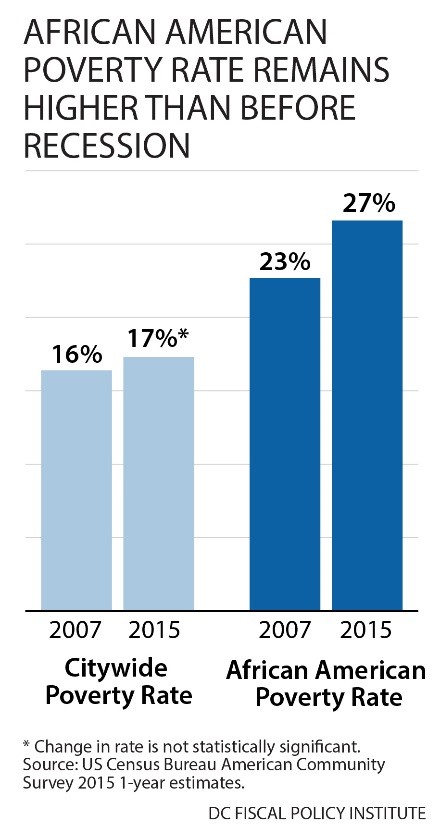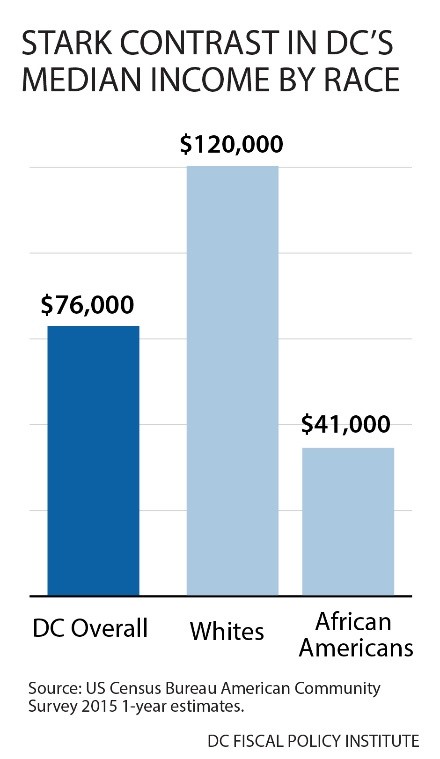The District’s economy has grown substantially since the Great Recession, but the city’s economic rebound hasn’t lifted more residents above the poverty line, or boosted the incomes of people of color, as new data released today by the U.S. Census Bureau show. These trends point to the need to ensure DC residents can more equally benefit from the city’s growing prosperity.
The city’s median income reached $75,600 in 2015, an increase of about $4,000 over the previous year, and $13,000 above the pre-recession 2007 level, after adjusting for inflation. This gain follows the nationwide trend that median incomes are increasing.
Yet this growth has not reduced the city’s poverty rate. Overall, 110,500 District residents lived below the federal poverty line in 2015 (income below $24,000 for a family of four)—that’s 18,500 more residents living in poverty than in 2007. The city’s poverty rate stands at 17 percent.
The city’s Black residents are bearing the brunt of the city’s persistent poverty—moreover, they are the only racial or ethnic group to see an increase in their poverty rate since 2007. Some 27 percent of the city’s Black population lived in poverty in 2015, up from 23 percent in 2007. And nearly three-quarters of all District residents who live in poverty are Black.
There also is a growing gulf between the incomes of white and Black residents. The median income for white DC households was $120,000 in 2015, compared to just $41,000 for Black households. While incomes have risen for white residents since 2007, the income of Black residents has been stagnant.
The large differences in poverty and income mirrors the city’s racial disparity in educational attainment, which in large part reflects the history of discrimination and limited educational opportunities for Black Americans. While nearly 90 percent of white DC residents have a college degree, just 26 percent of Black residents do. Black residents are also much less likely to have a high school diploma: 15 percent of Black residents aged 25 and older do not have a high school credential, compared to less than 2 percent of white residents.
Poverty is correlated with educational attainment, because without a high school diploma or a college degree, it is difficult to find and hold a good quality job. The poverty rate for DC residents with less than a high school degree was 33 percent in 2015, versus just 5 percent for those with a bachelor’s degree, and twice the rate of the population overall. These differences have been largely unchanged over time. DC residents without a college degree have seen falling wages, while college-educated residents have experienced an increase in pay, previous DCFPI research has found.
These data underscore the fact that the city’s new and growing prosperity has left many poor residents and people of color behind.
The city should do more to ensure that all of DC’s residents—including communities of color—share in the city’s recent economic growth. These policies can include:
- Reforming the TANF time limit. TANF provides necessary monetary assistance to some of DC’s lowest income families. A rigid time limit scheduled to go into effect next year will put these already vulnerable families at risk of losing all assistance. This endangers the financial and mental well-being not only of parents, but also their children. If reforms to the TANF time limits are not made, some 5,800 District families—approximately 98 percent of whom are Black—will lose their TANF benefits next year.
- Improving the quality of jobs for all working residents. Policies include requiring employers to offer additional hours to existing employers rather than hiring additional staff; giving workers advance notice of their weekly schedules; and creating a system to provide paid leave to workers who take time off for a personal illness or to care for a family member.
- Expanding early childhood education subsidies. This will improve the ability of providers to serve infants and toddlers in DC while sustaining their businesses for the long-term. This will benefit low-income working families by helping to prepare their children for success.
- Reforming the city’s job training system. Efforts should focus on offering entry-level jobs and career pathways for workers without advanced education. Given the large number of residents without a high school credential, reforms should focus on adult literacy as well as training and credentialing.


